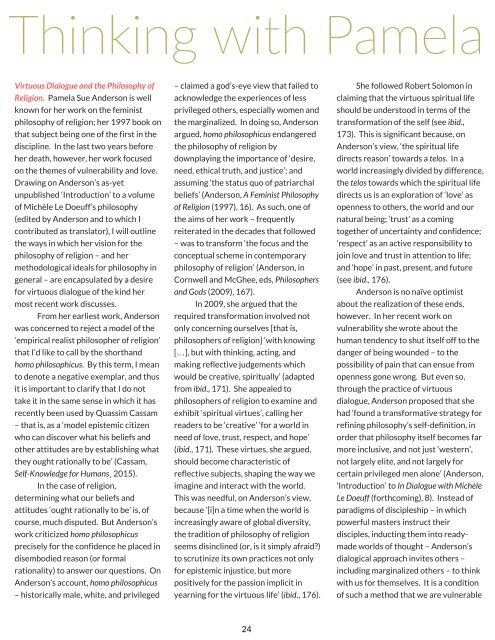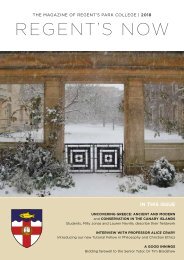RN17
Create successful ePaper yourself
Turn your PDF publications into a flip-book with our unique Google optimized e-Paper software.
Thinking with Pamela<br />
Virtuous Dialogue and the Philosophy of<br />
Religion. Pamela Sue Anderson is well<br />
known for her work on the feminist<br />
philosophy of religion; her 1997 book on<br />
that subject being one of the first in the<br />
discipline. In the last two years before<br />
her death, however, her work focused<br />
on the themes of vulnerability and love.<br />
Drawing on Anderson’s as-yet<br />
unpublished ‘Introduction’ to a volume<br />
of Michèle Le Doeuff’s philosophy<br />
(edited by Anderson and to which I<br />
contributed as translator), I will outline<br />
the ways in which her vision for the<br />
philosophy of religion – and her<br />
methodological ideals for philosophy in<br />
general – are encapsulated by a desire<br />
for virtuous dialogue of the kind her<br />
most recent work discusses.<br />
From her earliest work, Anderson<br />
was concerned to reject a model of the<br />
‘empirical realist philosopher of religion’<br />
that I’d like to call by the shorthand<br />
homo philosophicus. By this term, I mean<br />
to denote a negative exemplar, and thus<br />
it is important to clarify that I do not<br />
take it in the same sense in which it has<br />
recently been used by Quassim Cassam<br />
– that is, as a ‘model epistemic citizen<br />
who can discover what his beliefs and<br />
other attitudes are by establishing what<br />
they ought rationally to be’ (Cassam,<br />
Self-Knowledge for Humans¸ 2015).<br />
In the case of religion,<br />
determining what our beliefs and<br />
attitudes ‘ought rationally to be’ is, of<br />
course, much disputed. But Anderson’s<br />
work criticized homo philosophicus<br />
precisely for the confidence he placed in<br />
disembodied reason (or formal<br />
rationality) to answer our questions. On<br />
Anderson’s account, homo philosophicus<br />
– historically male, white, and privileged<br />
– claimed a god’s-eye view that failed to<br />
acknowledge the experiences of less<br />
privileged others, especially women and<br />
the marginalized. In doing so, Anderson<br />
argued, homo philosophicus endangered<br />
the philosophy of religion by<br />
downplaying the importance of ‘desire,<br />
need, ethical truth, and justice’; and<br />
assuming ‘the status quo of patriarchal<br />
beliefs’ (Anderson, A Feminist Philosophy<br />
of Religion (1997), 16). As such, one of<br />
the aims of her work – frequently<br />
reiterated in the decades that followed<br />
– was to transform ‘the focus and the<br />
conceptual scheme in contemporary<br />
philosophy of religion’ (Anderson, in<br />
Cornwell and McGhee, eds, Philosophers<br />
and Gods (2009), 167).<br />
In 2009, she argued that the<br />
required transformation involved not<br />
only concerning ourselves [that is,<br />
philosophers of religion] ‘with knowing<br />
[…], but with thinking, acting, and<br />
making reflective judgements which<br />
would be creative, spiritually’ (adapted<br />
from ibid., 171). She appealed to<br />
philosophers of religion to examine and<br />
exhibit ‘spiritual virtues’, calling her<br />
readers to be ‘creative’ ‘for a world in<br />
need of love, trust, respect, and hope’<br />
(ibid., 171). These virtues, she argued,<br />
should become characteristic of<br />
reflective subjects, shaping the way we<br />
imagine and interact with the world.<br />
This was needful, on Anderson’s view,<br />
because ‘[i]n a time when the world is<br />
increasingly aware of global diversity,<br />
the tradition of philosophy of religion<br />
seems disinclined (or, is it simply afraid?)<br />
to scrutinize its own practices not only<br />
for epistemic injustice, but more<br />
positively for the passion implicit in<br />
yearning for the virtuous life’ (ibid., 176).<br />
She followed Robert Solomon in<br />
claiming that the virtuous spiritual life<br />
should be understood in terms of the<br />
transformation of the self (see ibid.,<br />
173). This is significant because, on<br />
Anderson’s view, ‘the spiritual life<br />
directs reason’ towards a telos. In a<br />
world increasingly divided by difference,<br />
the telos towards which the spiritual life<br />
directs us is an exploration of ‘love’ as<br />
openness to others, the world and our<br />
natural being; ‘trust’ as a coming<br />
together of uncertainty and confidence;<br />
‘respect’ as an active responsibility to<br />
join love and trust in attention to life;<br />
and ‘hope’ in past, present, and future<br />
(see ibid., 176).<br />
Anderson is no naïve optimist<br />
about the realization of these ends,<br />
however. In her recent work on<br />
vulnerability she wrote about the<br />
human tendency to shut itself off to the<br />
danger of being wounded – to the<br />
possibility of pain that can ensue from<br />
openness gone wrong. But even so,<br />
through the practice of virtuous<br />
dialogue, Anderson proposed that she<br />
had ‘found a transformative strategy for<br />
refining philosophy’s self-definition, in<br />
order that philosophy itself becomes far<br />
more inclusive, and not just ‘western’,<br />
not largely elite, and not largely for<br />
certain privileged men alone’ (Anderson,<br />
‘Introduction’ to In Dialogue with Michèle<br />
Le Doeuff (forthcoming), 8). Instead of<br />
paradigms of discipleship – in which<br />
powerful masters instruct their<br />
disciples, inducting them into readymade<br />
worlds of thought – Anderson’s<br />
dialogical approach invites others –<br />
including marginalized others – to think<br />
with us for themselves. It is a condition<br />
of such a method that we are vulnerable<br />
24





